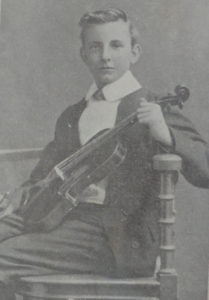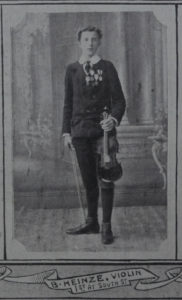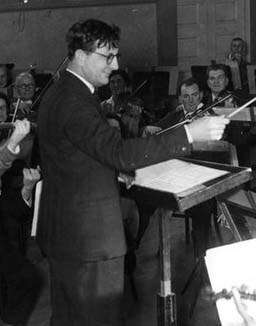Bernard Thomas Heinze
June 24, 2015

Sir Bernard Heinze pictured with a violin in 1907.
HEINZE, Bernard Thomas- – – SPC 1905-1912
DoB:- – 1 July 1894, Smeaton, VIC
Father:– – Benjamin Heinze (Jeweller)
Mother:– – Minnie Frederica, nee Greenwell
Bernard Heinze attended St Patrick’s with his brother, Ferdinand Benjamin Heinze, who also enlisted in the AIF. He was an exceptional music student, receiving violin lessons from a young age, under the guidance of Walter Gude, himself a music teacher at St Patrick’s College from 1901 to 1941. Bernard was awarded the Sir William Clarke Scholarship at the Royal College of Music in London in 1913.
The College Annual of 1912 noted,
-‘-¦ We were all, of course, proud of Bernard Heinze, who had brought so much honour to his Alma Mater by gaining the Clarke Scholarship; and, to show our interest in him, we must needs be present in full force at the concert tendered to him by his many friends in Ballarat. If we were proud of Bernard before going to the concert, we had much more reason to be so after hearing him play, for amid the galaxy of talent presented that evening, his performance was especially remarkable, and it was generally admitted, formed a feature of the concert -¦’

Bernard is pictured here in 1909 while competing at the Royal South Street Competitions.
The following year, the Annual again reported on St Patrick’s famous musical son, noting that -“
-‘-¦ Bernard Heinze will be, by this, most likely on his way to London to bring out the fund of musical talent of which he gave such proofs as the following in SPC, under the able tuition of Mr Gude:-
1907 -“ 1st prize, under 13, South Street Competitions; 1st prize, under 16, Creswick Competitions. 1909 -“ 1st prize, under 16, South Street Competitions; 1st prize, under 18, South Street Competitions; obtained Honours, Junior Grade, Royal Academy Examination. 1910 -“ Obtained Honours, Senior Grade, Royal Academy Examinations. 1911 -“ Obtained Honours, Grade 3, Melbourne University Examinations; obtained Licentiate (LAB), Royal Academy Exhibitions. 1912 -“ Won three years’ Exhibition Melbourne University; won Sir William Clarke’s Scholarship, entitling him to three years’ study at Royal College of Music London. And the end is not yet! We are sure it will be worthy of such a hard-working and brilliant beginning -¦’
At the outbreak of war, Bernard Heinze was residing in England, and when he enlisted for service it was with the British forces in the Royal Garrison Artillery. He served on the Western Front, at Arras, Ypres, the Somme and Passchendaele. He was also an aide-de-camp to Major General Sir Herbert Guthrie Smith, the director of artillery.
After the war, Heinze resumed his studies in Paris, and returned to Australia in 1923.
In 1926, at the young age of 32, Bernard Heinze was appointed Ormond Professor of Music at the University of Melbourne, a position he held until 1957. He was offered the conductorship of the Melbourne Philharmonic Society (later the Royal Melbourne Philharmonic) in 1927. In 1929 Heinze was appointed music advisor to the ABC, where he oversaw the inception of its State orchestras, celebrity concerts, youth concerts and fine music broadcasting.

Bernard is pictured here in 1935 with the Sydney Symphony Orchestra.
From 1932 to 1937 Heinze was co-chief conductor of the MSO, and sole chief conductor until 1950. He was Director of the NSW Conservatorium of Music from 1956 to 1966. After leaving this post, he continued to conduct the major Australian orchestras on a regular basis until the late 1970s.
He became a Fellow of the Royal College of Music in 1931. He was knighted in 1949, the first Australian musician to receive this honour. Sir Bernard was named the 1974 Australian of the Year. On Australia Day in 1976, he was appointed a Companion of the Order of Australia for his services to Australian music. In 1979 he became the first Australian to receive UNESCO’s International Music Council award.
Sir Bernard Heinze remained fit and healthy well into his eighties. He died at Bellevue Hill, Sydney on 10 June 1982, and was survived by his wife, Valerie (nee Hennessy) and their three sons. He was buried at Brighton Cemetery, Victoria.
The Australian Dictionary of Biography remembers Sir Bernard as leaving behind -‘-¦ an immense legacy, securing for serious music a permanent place in Australia -¦ In 1957 a portrait by Paul Fitzgerald was presented to the university conservatorium, and in 1975 the ABC televised a biographical feature, -‘The Bernard Heinze Story’. An annual award in his name, established in 1985, is given in recognition of an outstanding contribution to music in Australia’.

Sir Bernard Heinze was named Australian of the Year in 1961.

